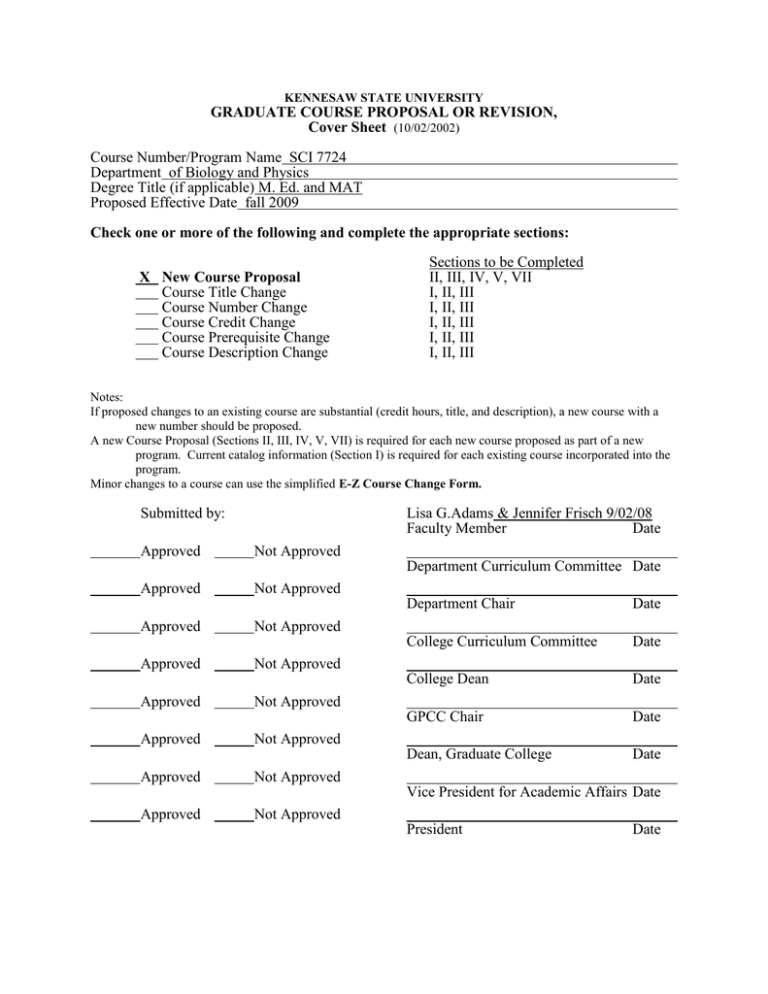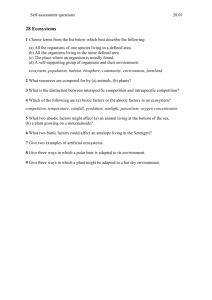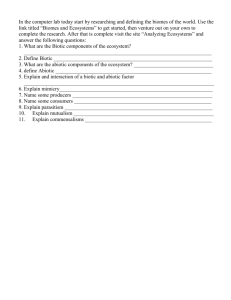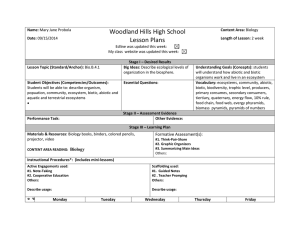GRADUATE COURSE PROPOSAL OR REVISION, Cover Sheet
advertisement

KENNESAW STATE UNIVERSITY GRADUATE COURSE PROPOSAL OR REVISION, Cover Sheet (10/02/2002) Course Number/Program Name SCI 7724 Department of Biology and Physics Degree Title (if applicable) M. Ed. and MAT Proposed Effective Date fall 2009 Check one or more of the following and complete the appropriate sections: X New Course Proposal Course Title Change Course Number Change Course Credit Change Course Prerequisite Change Course Description Change Sections to be Completed II, III, IV, V, VII I, II, III I, II, III I, II, III I, II, III I, II, III Notes: If proposed changes to an existing course are substantial (credit hours, title, and description), a new course with a new number should be proposed. A new Course Proposal (Sections II, III, IV, V, VII) is required for each new course proposed as part of a new program. Current catalog information (Section I) is required for each existing course incorporated into the program. Minor changes to a course can use the simplified E-Z Course Change Form. Submitted by: Approved Lisa G.Adams & Jennifer Frisch 9/02/08 Faculty Member Date Not Approved Department Curriculum Committee Date Approved Approved Approved Approved Approved Approved Not Approved Department Chair Date College Curriculum Committee Date College Dean Date GPCC Chair Date Dean, Graduate College Date Not Approved Not Approved Not Approved Not Approved Not Approved Vice President for Academic Affairs Date Approved Not Approved President Date KENNESAW STATE UNIVERSITY GRADUATE COURSE/CONCENTRATION/PROGRAM CHANGE I. Current Information (Fill in for changes) Page Number in Current Catalog Course Prefix and Number Course Title Credit Hours Prerequisites Description (or Current Degree Requirements) II. Proposed Information (Fill in for changes and new courses) Course Prefix and Number _____________SCI 7724___________ Course Title _________________ Environmental Science_______ Credit Hours 3-0-3 Prerequisites admission to graduate studies in education Description (or Proposed Degree Requirements) This course will explore concepts and processes in the environmental sciences appropriate for the teachers of adolescent and young adult learners. Emphasis will be placed on the following concepts: flow of energy and cycling of matter in an ecosystem, interconnection of Earth’s systems, stability and change in ecosystems, resource use and conservation, and human impact. Individual projects will focus on materials appropriate for different age groups. III. Justification Students in the M.A.T. and M.Ed. for secondary science education degree programs will need to have a breadth of science content understanding from all branches of science. The proposed course offers an additional choice for these students. SCI 7724 will offer students an opportunity to expand their understanding of environmental problems and solutions. The course will prepare our M.Ed. and M.A.T. students to teach Environmental Science, which is an elective in many high schools, and has associated Georgia Performance Standards (GPS) which will need to be addressed. IV. Additional Information (for New Courses only) Instructor: Lisa Adams and Jennifer Frisch Text: Not selected yet Prerequisites: Admission into the M.A.T. or M.Ed. programs Objectives: After completing the course, 1. Students will have a solid conceptual understanding of all of the Georgia Performance Standards (GPS) related to Environmental Science (available http://www.georgiastandards.org), including but not limited to the following: Students will investigate the flow of energy and cycling of matter in an ecosystem, including biogeochemical cycles, food webs, trophic levels Students will demonstrate an understanding of abiotic and biotic components in an ecosystem Students will characterize land biomes and freshwater and marine systems Students will explain succession Students will describe population dynamics and symbiotic relationships Students will differentiate between renewable and nonrenewable resources, including limitations Students will describe the commonly used fuels and some alternative fuels including availability and problems with each Students will explain how human activities affect global and local sustainability Students will describe how political, legal, social, and economic decisions may affect global and local ecosystems. 2. Students will continue to expand and develop their understanding of the nature of science. 3. Students will collaborate to discuss, develop, and implement an inquirybased, environmental science lesson. Instructional Method - A combination of lecture and in-class activities will be used to instruct the class, and team-peer-teaching projects will also be used to enhance students’ knowledge and skills in teaching. Method of Evaluation - Both formative (in the form of quizzes, in-class assignments, and/or homework assignments) and summative assessments will be used. In accordance with the template used for the other 772x courses in the program, the following grading design will be followed: EXAM 1: 30% of grade EXAM 2: 30% of grade PARTICIPATION/ FORMATIVE ASSESSMENTS: 20% of grade TEACHING PROJECT: 20% of grade V. Resources and Funding Required (New Courses only) Resource Amount A set of 6 classroom sensors and handheld devices ($1,341.00 x 6) = $8,046.Miscellaneous classroom supplies for activities and demos $1,000.00 Audio visual material (DVDs) $500.00 Library resources for reserve $500.00 TOTAL $10,046.00 Funding Required Beyond Normal Departmental Growth VI. COURSE MASTER FORM This form will be completed by the requesting department and will be sent to the Office of the Registrar once the course has been approved by the Office of the President. The form is required for all new courses. DISCIPLINE COURSE NUMBER COURSE TITLE FOR LABEL (Note: Limit 30 spaces) CLASS-LAB-CREDIT HOURS Approval, Effective Term Grades Allowed (Regular or S/U) If course used to satisfy CPC, what areas? Learning Support Programs courses which are required as prerequisites Science SCI7724 ENVIRONMENTAL SCIENCE 3-0-3 APPROVED: ________________________________________________ Vice President for Academic Affairs or Designee __ VII Attach Syllabus SCI 7724 ENVIRONMENTAL SCIENCE Course Policies and Syllabus I. Course Title: SCI 7724 Environmental Science 3 Credit Hours Policies and Syllabus, II. Instructors: Lisa Adams, Ph.D. Jennifer Kreps Frisch, Ph.D. III. Class Meetings: IV. Texts: TBD You will also need to consult the Benchmarks for Science Literacy, (AAAS 1993), which can be read online at this address: http://www.project2061.org/publications/bsl/default.htm V. CATALOG COURSE DESCRIPTION: SCI 7724. Environmental Science. 3-0-3. Prerequisite: Admission to graduate study in education. This course will explore concepts and processes in the environmental sciences appropriate for the teachers of adolescent and young adult learners. Emphasis will be placed on the following concepts: flow of energy and cycling of matter in an ecosystem, interconnection of Earth’s systems, stability and change in ecosystems, resource use and conservation, and human impact. Individual projects will focus on materials appropriate for different age groups. VI. PURPOSE / RATIONALE: The purpose of this course is to extend depth and breadth of environmental science subject matter knowledge for pedagogical intentions germane to early and late adolescence. Toward that end, we work toward a mastery and fluency in the fundamental principles of environmental science for application to the teaching practice of candidates in the Science Cohort of the Masters in Adolescent Education. Through participation in this course, students will 1. extend their pedagogical content knowledge for environmental science, 2. work in a co-teaching team of 2-3 students to design, implement, and evaluate environmental science lessons that address one Benchmark for Science Literacy (AAAS, 1993), and relate the chosen benchmark to relevant Georgia Performance Standards for high school students CONCEPTUAL FRAMEWORK: Collaborative Development of Expertise in Teaching and Learning The Kennesaw State University teacher education faculty are committed to preparing teachers who demonstrate expertise in facilitating learning in all students. Toward that end, the KSU teacher education community strongly upholds the concept of collaborative preparation requiring guidance from professionals inside and outside the university. In tandem with this belief is the understanding that teacher expertise develops along a continuum which includes the stages of preservice, induction, inservice, and renewal; further, as candidates develop a strong research-based knowledge of content and pedagogy, they develop their professional expertise in recognizing, facilitating, assessing, and evaluating student learning. While completing your graduate program at Kennesaw State University, you are required to be involved in a variety of leadership and school-based activities directed at the improvement of teaching and learning. Appropriate activities may include, but are not limited to, attending and presenting at professional conferences, actively serving on or chairing school-based committees, attending PTA/school board meetings, leading or presenting professional development activities at the school or district level, and participating in education-related community events. As you continue your educational experiences, you are encouraged to explore every opportunity to learn by doing. For example, after working with the curriculum guides in this course, you may decide to become a project facilitator, and we can explain how you can do that. Knowledge Base: Teacher development is generally recognized as a continuum that includes four phases: preservice, induction, in-service, renewal (Odell, Huling, and Sweeny, 2000). Just as Sternberg (1996) believes that the concept of expertise is central to analyzing the teaching-learning process, the teacher education faculty at KSU believe that the concept of expertise is central to preparing effective classroom teachers and teacher leaders. Researchers describe how during the continuum phases teachers progress from being Novices learning to survive in classrooms toward becoming Experts who have achieved elegance in their teaching. We, like Sternberg (1998), believe that expertise is not an end-state but a process of continued development. Use of Technology: Technology Standards for Educators are required by the Professional Standards Commission. Telecommunication and information technologies will be integrated throughout the master teacher preparation program, and all candidates must be able to use technology to improve student learning and meet Georgia Technology Standards for Educators. During the courses, candidates will be provided with opportunities to explore and use instructional media. They will master use of productivity tools, such as multimedia facilities, local-net and Internet, and feel confident to design multimedia instructional materials, and create WWW resources. Professional educators will become acquainted with and use electronic portfolio hardware and software available through TRAC and other computer labs on campus. Using this equipment will provide students with an exceptionally well-developed, compact portfolio product, which can include edited video teaching vignettes and accompanying reflective analysis for the exit portfolio. Candidates will also develop expertise in presentation software for use in their classes, as well as at professional meetings. Diversity: A variety of materials and instructional strategies will be employed to meet the needs of different learning styles of diverse learners in class. Candidates will gain knowledge as well as an understanding of differentiated strategies and curricula for providing effective instruction and assessment within multicultural classrooms. One element of course work is raising candidate awareness of critical multicultural issues. A second element is to cause candidates to explore how multiple attributes of multicultural populations influence decisions in employing specific methods and materials for every student. Among these attributes are ethnicity, race, socioeconomic status, gender, giftedness, disability, language, religion, family structure, sexual orientation and geographic region. An emphasis on cognitive style differences provides a background for the consideration of cultural context. Kennesaw State University provides program accessibility and accommodations for persons defined as disabled under Section 504 of the Rehabilitation Act of 1973 or the Americans with Disabilities Act of 1990. A number of services are available to support students with disabilities within their academic program. In order to make arrangements for special services, students must visit the Office of Disabled Student Support Services (770-423-6443) and develop an individual assistance plan. In some cases, certification of disability is required. Please be aware that there are other support/mentor groups on the campus of Kennesaw State University that address each of the multicultural variables outlined above. For more information contact the Student Life Center at 770-423-6280. Academic Integrity: Every KSU student is responsible for upholding the provisions of the Student code of Conduct, as published in the Undergraduate and Graduate catalogs. Section II of the Student Code of Conduct addresses the University’s policy on academic honesty, including provisions regarding plagiarism and cheating, unauthorized access to University materials, misrepresentation or falsification of University records or academic malicious/intentional misuses of computer facilities and/or services, and misuse of student identification cards. Incidents of alleged academic misconduct will be handled through the established procedures of the University Judiciary Program, which includes either an “Informal” resolution by a faculty member, resulting in a grade adjustment, or a formal hearing procedure, which may subject a student to the code of conduct’s minimum one semester suspension requirement. Academic Withdrawal (from College or Individual Courses) Students who find that they cannot continue in college for the entire quarter after being enrolled, because of illness or any other reason, should complete an official withdrawal form. Forms may be obtained from the Office of the Registrar. Students who officially withdraw from college with the approval of the College Dean will be assigned grades of “W” which will not affect their overall scholastic average. Those students who stop attending classes and notify no one usually are assigned failing grades which jeopardize their chances of future academic success. Students may, by means of the same withdrawal form and with the approval of the College Dean, withdraw from individual courses while retaining other courses on their schedule. The last day to withdraw without academic penalty for this quarter is INSERT DATE HERE. Failure to do so will mean the student has elected to receive the final grade earned in the course. The only exception to these withdrawal regulations will be for those instances that involve unusual and fully documented circumstances. Attendance/Academic Policies: You are expected to attend each of our class sessions. Attendance is encouraged by making this course worthy of your time and talent. Our class meeting will involve interactive lecture, discussions, inquiry and other hands-activities, and student presentations. Attendance and participation are prerequisites to learning. It is recognized that students get sick, have family emergencies, and other needs emerge that may lead you to choose to miss class. If you miss no class sessions during the semester, are on time each day, participate fully in class activities, and earn all the points available as Participation & Formative Assessment items, you will earn the entire 20% allotted for this category towards the course grade. Each absence will result in the deduction of 5% from your grade. Class begins at noon and ends at 3:45 pm. Each tardy (or early exit) will result in the deduction of 2% from your grade. Missing more than 50 minutes of instruction will count as an absence. If you have extenuating circumstances that cause you to be absent or tardy, please inform the instructors of your situation, but do not expect us to modify these policies. If you are still reading, I regret that I have to impose such a policy on adults. I prefer the policy “Integrity Needs No Rules”, however, past experiences have led me to specify and maintain the above policy. Description of Evaluation Criteria: The formative assessment component of this course will allow me to assess your progress toward mastery of course objectives via frequent quizzes administered during class, activity-related work collected for evaluation, and homework assigned on occasion. The lowest three scores from these formative assessment grades will be dropped from your final average. It is not possible to make up missed quizzes or lab activities competed during class sessions. Late work is not accepted. Two unit tests are administered in this course. There is no comprehensive final exam. The two tests will be traditional in format including multiple choice and free response items. Exams will cover both content and pedagogy. I expect you to have an in-depth understanding of the concepts we will discuss in class and use Project curriculum guides to teach. You are expected to deepen your understanding of these concepts, and participate in class discussions in order to construct your understanding. Objective items on these exams will span the scale of Bloom’s Taxonomy, and include some interpretive and analytical scenarios. The free-response items will be evaluated using rubrics. You will be given instructional objectives to guide your study. For the individual project, you are to work in a co-teaching team of 2-3 students to design, implement, and evaluate an environmental science lesson that addresses one Benchmark for Science Literacy, and trace it to relevant Georgia Performance Standards (GPS). More details on the teaching project will be discussed in class. Grading Plan: Your final grade for this course will be calculated according to the following percentages: Final grade: A > 89.99, B >79.99, C > 69.99, D > 49.99, F otherwise Evaluation Item Percentage Participation & Formative Assessment: Lab work, Quizzes, & Assignments 20% Unit 1 Test 30% Unit 2 Test: 30% Individual Project 20% LEARNING OBJECTIVES for the course will be adapted directly from the Environmental Science Georgia Performance Standards, though you are expected to have a deeper understanding of the concepts than a high-school student would have. The Environmental Science content GPS are below: SEV1. Students will investigate the flow of energy and cycling of matter within an ecosystem and relate these phenomena to human society. a. Interpret biogeochemical cycles including hydrologic, nitrogen, phosphorus, oxygen, and carbon cycles. Recognize that energy is not recycled in ecosystems. b. Relate energy changes to food chains, food webs, and to trophic levels in a generalized ecosystem, recognizing that entropy is a primary factor in the loss of usable food energy during movement up the trophic levels. c. Relate food production and quality of nutrition to population growth and the trophic levels d. Relate the cycling of matter and the flow of energy to the Laws of Conservation of matter and energy. Identify the role and importance of decomposers in the recycling process. e. Distinguish between abiotic and biotic factors in an ecosystem and describe how matter and energy move between these. SEV2. Students will demonstrate an understanding that the Earth is one interconnected system. a. Describe how the abiotic components (water, air, and energy) affect the biosphere. b. Recognize and give examples of the hierarchy of the biological entities of the biosphere (organisms, populations, communities, ecosystems, and biosphere). c. Characterize the components that define a Biome. Abiotic Factors – to include precipitation, temperature and soils. Biotic Factors – plant and animal adaptations that create success in that biome. d. Characterize the components that define fresh-water and marine systems. Abiotic Factors – to include light, dissolved oxygen, phosphorus, nitrogen, pH and substrate. Biotic Factors – plant and animal adaptations characteristic to that system. SEV3. Students will describe stability and change in ecosystems. a. Describe interconnections between abiotic and biotic factors, including normal cyclic fluctuations and changes associated with climatic change (i.e. ice ages). b. Explain succession in terms of changes in communities through time to include changes in biomass, diversity, and complexity. c. Explain how succession may be altered by traumatic events. d. Explain how biotic and abiotic factors influence populations. e. Describe interactions between individuals (i.e. mutualism, commensalisms, parasitism, predation, and competition). SEV4. Students will understand and describe availability, allocation and conservation of energy and other resources a. Differentiate between renewable and nonrenewable resources including how different resources are produced, rates of use, renewal rates, and limitations of sources. Distinguish between natural and produced resources. b. Describe how technology is increasing the efficiency of utilization and accessibility of resources. c. Describe how energy and other resource utilization impact the environment and recognize that individuals as well as larger entities (businesses, governments, etc.) have impact on energy efficiency. d. Describe the relationship of energy consumption and the living standards of societies. e. Describe the commonly used fuels (e.g. fossil fuels, nuclear fuels, etc.) and some alternative fuels (e.g. wind, solar, ethanol, etc.) including the required technology, availability, pollution problems and implementation problems. Recognize the origin of fossil fuels and the problems associated with our dependence on this energy source. f. Describe the need for informed decision making of resource utilization. (i.e. energy and water usage allocation, conservation, food and land, and long-term depletion) SEV5. Students will recognize that human beings are part of the global ecosystem and will evaluate the effects of human activities and technology on ecosystems. a. Describe factors affecting population growth of all organisms, including humans. Relate these to factors affecting growth rates and carrying capacity of the environment. b. Describe the effects of population growth, demographic transitions, cultural differences, emergent diseases, etc. on societal stability. c. Explain how human activities affect global and local sustainability. d. Describe the actual and potential effects of habitat destruction, erosion, and depletion of soil fertility associated with human activities. e. Describe the effects and potential implications of pollution and resource depletion on the environment at the local and global levels (e.g. air and water pollution, solid waste disposal, depletion of the stratospheric ozone, global warming, and land uses). f. Describe how political, legal, social, and economic decisions may affect global and local ecosystems. Georgia Department of Education Kathy Cox, State Superintendent of Schools Accessed from http://georgiastandards.org 8/29/2006 3:50 PM All Rights Reserved Approved July 13, 2006



